 12 citations,
March 2018 in “Medicine”
12 citations,
March 2018 in “Medicine” A postmenopausal woman's hirsutism and high testosterone levels improved after surgery for an ovarian tumor not seen on ultrasound.
 February 2022 in “CRC Press eBooks”
February 2022 in “CRC Press eBooks” Hair disorders include hair loss, excessive hair growth, and ingrown hairs, with various treatments available depending on the cause.
 58 citations,
October 2001 in “Dermatologic Clinics”
58 citations,
October 2001 in “Dermatologic Clinics” Hair loss can indicate underlying systemic diseases and addressing these can sometimes reverse the hair loss.
 64 citations,
May 2003 in “Journal of health psychology”
64 citations,
May 2003 in “Journal of health psychology” Women with excess body hair feel psychological distress influenced by societal beauty standards, but distress isn't directly linked to the amount of hair.
Hirsutism is excessive male-pattern hair growth in women, often treated cosmetically or with hormone therapy if contraception is also desired.
 53 citations,
October 1984 in “Endocrine reviews”
53 citations,
October 1984 in “Endocrine reviews” Excessive hair growth in women often has no known cause and is not linked to race or other hormonal symptoms.
 1 citations,
October 1984 in “Clinics in dermatology”
1 citations,
October 1984 in “Clinics in dermatology” People distressed by minor skin changes should consult dermatologists with cosmetic expertise, and a public Cosmetic Dermatology Service with mental health support is recommended.
 October 2023 in “Clinical case reports”
October 2023 in “Clinical case reports” A woman's male-pattern facial hair growth was caused by a rare malignant ovarian tumor that was difficult to diagnose and treat.
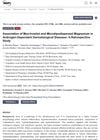 February 2025 in “Pharmaceuticals”
February 2025 in “Pharmaceuticals” Myo-inositol with magnesium effectively reduces acne and hirsutism in PCOS patients without side effects.
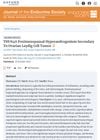 October 2023 in “Journal of the Endocrine Society”
October 2023 in “Journal of the Endocrine Society” A woman's increased facial hair and hair loss were caused by a rare ovarian tumor, cured by surgery.

Benign ovarian tumors can cause excess male hormones and related conditions in postmenopausal women.
 24 citations,
November 2016 in “Molecular Medicine Reports”
24 citations,
November 2016 in “Molecular Medicine Reports” Hormonal imbalances, often indicating conditions like PCOS, are common in women with hard-to-treat acne, and a treatment approach addressing these imbalances may be needed.
 27 citations,
October 2016 in “The Journal of Clinical Endocrinology and Metabolism”
27 citations,
October 2016 in “The Journal of Clinical Endocrinology and Metabolism” Daughters of women with PCOS generally experience normal puberty but may have more body hair and different body fat distribution.
 14 citations,
October 2016 in “Physiological Research”
14 citations,
October 2016 in “Physiological Research” Alfacalcidiol and metformin together lowered testosterone in women with PCOS, but did not significantly improve acne, hair growth, or pregnancy rates.
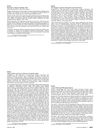
The main cause of hirsutism in Algerian women is polycystic ovary syndrome, and those affected should be checked for related hormonal issues.
July 2001 in “Pediatrics in review” The girl's increased hair growth and other symptoms were due to a hormone-secreting ovarian tumor, which was successfully treated with surgery.
 2 citations,
January 1984 in “Progress in neuro-psychopharmacology & biological psychiatry”
2 citations,
January 1984 in “Progress in neuro-psychopharmacology & biological psychiatry” Benzodiazepines changed hormone levels but did not affect hair growth in women with idiopathic hirsutism.
17 citations,
January 1984 in “Psychotherapy and psychosomatics” Antiandrogen treatment can reduce sexual enjoyment in women with excess male hormones, especially those in stable relationships.
4 citations,
July 1983 in “Journal of steroid biochemistry/Journal of Steroid Biochemistry” Certain hormones can reduce skin oil and hair growth, potentially helping treat acne and excessive hair in women.
5 citations,
June 1983 in “International Journal of Dermatology” Individualized treatment is crucial for managing hirsutism in women.
 29 citations,
April 2004 in “Annals of Pharmacotherapy”
29 citations,
April 2004 in “Annals of Pharmacotherapy” Finasteride reduces hirsutism effectively with fewer side effects but is a second-choice treatment due to safety concerns.
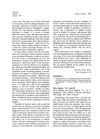 January 1983 in “Journal of The American Academy of Dermatology”
January 1983 in “Journal of The American Academy of Dermatology” The document suggests improvements for a hair and scalp disease book and recommends a two-volume skin surgery reference for dermatologists.
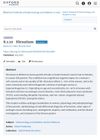 July 2011 in “Oxford University Press eBooks”
July 2011 in “Oxford University Press eBooks” The document's conclusion cannot be determined without content to analyze.
3 citations,
December 1982 in “Australasian journal of dermatology” Tailored treatments combining medication and hair removal methods are effective for managing excessive hair growth in women.
 44 citations,
June 1985 in “Fertility and sterility”
44 citations,
June 1985 in “Fertility and sterility” Combination drug therapy is effective for hirsutism that doesn't improve with just one medication.
 77 citations,
March 2001 in “Clinics in Dermatology”
77 citations,
March 2001 in “Clinics in Dermatology” Androgenetic alopecia involves genetics, hormones, and can be treated with medications or surgery.
1 citations,
May 2013 in “Hair transplant forum international” Non-classical 21 hydroxylase deficiency is an underdiagnosed cause of female hair loss and polycystic ovarian syndrome.
 10 citations,
January 2014 in “Endocrinology & metabolic syndrome”
10 citations,
January 2014 in “Endocrinology & metabolic syndrome” PCOS is a long-term condition that needs more research for better understanding and treatment.
 17 citations,
January 1995 in “The American Journal of Medicine”
17 citations,
January 1995 in “The American Journal of Medicine” The document concludes that proper diagnosis and tailored long-term treatment can effectively manage androgenic disorders in women, improving patient care outcomes.
 7 citations,
August 2023 in “EClinicalMedicine”
7 citations,
August 2023 in “EClinicalMedicine” Anti-androgens can help manage some PCOS symptoms better than metformin but are not more effective than placebos or birth control pills for other symptoms.






















